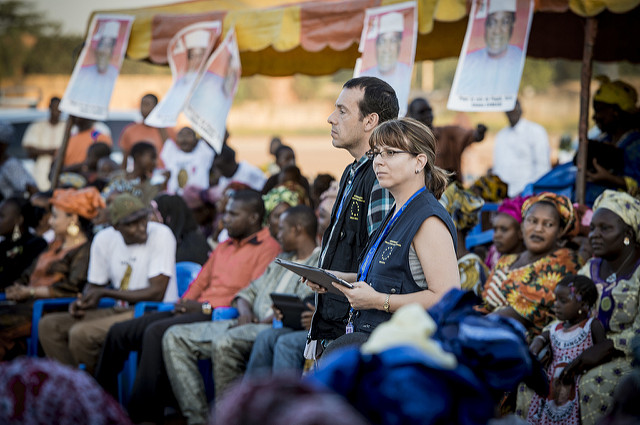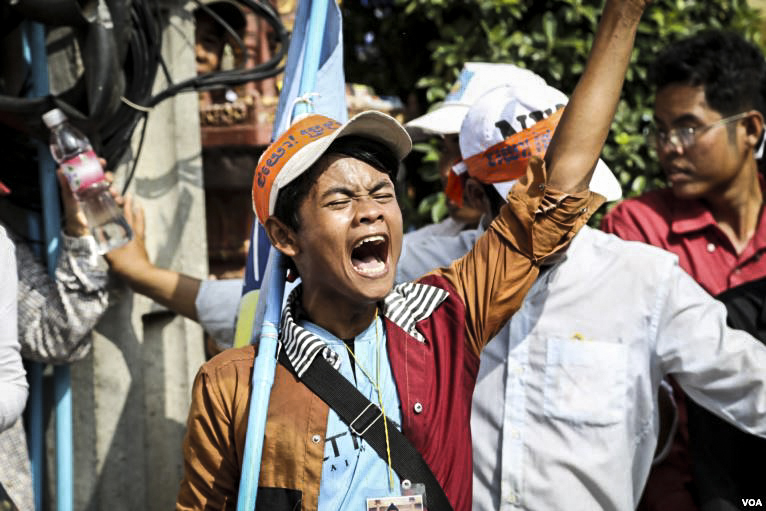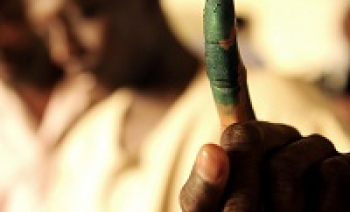The presence of international observers can be a strong deterrent to electoral fraud and violence. But their work can also prove instrumental in the long-term, contributing to improvements in future elections, fostering peace and development and facilitating democratic processes in the country.
“No election is ever perfect,” said Emanuele Giaufret, head of the Division for Democracy and Electoral Observation at the European External Action Service. “There are always improvements to be made, which is why it’s so important that international observers can come up with a good set of recommendations for adapting the electoral framework of the country that they’re sent to.”
Why methodology matters
Since 2000, the EU has deployed close to 140 Election Observation Missions and Election Assessment Teams to more than 60 countries around the world. The role of each mission is to closely observe and assess electoral procedures – before, during and after the election day – and to provide the country’s government, civil society and political parties with concrete suggestions for improving the process in the future.

EU election observation mission in Tunisia © Ezequiel Scagnetti/European Union
The EU first began sending observation missions to partner countries in the 1990s. In 2000, it adopted a new election observation methodology that laid out a more coherent deployment strategy, and provided guidelines on how to formulate assessments of electoral processes. “This clear and strict methodology has been key to giving us the necessary credibility,” said Giaufret. “It’s consistent, wherever we go, helping secure public trust in our work and establishing the EU as a leading force in international election observation.”
|
The European Instrument for Democracy and Human Rights EU election observation is financed through EIDHR, the European Instrument for Democracy and Human Rights. EIDHR was created with the objective of promoting and protecting human rights, fundamental freedoms and democracy in non-EU countries. In addition to financing EU observation missions, EIDHR also supports citizen observer organisations in partner countries. |
As part of the first stage in the deployment of an observation mission, an exploratory team is sent to the country to assess whether deploying observers is advisable, feasible and useful. The team procures a report, on the basis of which the High Representative of the Union for Foreign Affairs and Security (HRVP) makes the final decision.
The observation mission is then deployed to the country six to eight weeks before election day, to analyse the legal framework and voting mechanisms, and look at the political landscape, human rights situation and media coverage. The mission is made up of a core team of experts, led by a chief observer, normally from the European Parliament, in addition to long- and short-term observers, who are deployed across the country to assess the voting and counting procedures.
In the following video, Emanuele Giaufret, head of the Division for Democracy and Electoral Observation at the European External Action Service, explains the methodology used by EU Election Observation Missions in carrying out electoral observations.
The mission’s role is to observe and gather facts, without interfering in the process. “We attend campaign rallies, to see if fundamental freedoms of association, assembly and expression are respected,” said Giaufret. “We have a media monitoring group that finds out if all the political candidates have equal access to the media. We also follow voter registration procedures and analyse the systems for the resolution of any electoral disputes.”
Approximately 48 hours after the voting closes, the chief observer presents a preliminary public statement assessing the elections. However, the observation mission can remain in the country for much longer. “We don’t go there only to assess if the elections are fair, but also to support democratic reforms in those countries,” said Giaufret.
About a month after the election, the mission publishes a final, comprehensive report, in which it lays out key recommendations for improving the electoral procedures in the country. The report is given to the country’s government, and to the members of the civil society and political parties.
|
Electoral support provided by the European Union Election observation is one of two actions undertaken by the European Union to support credible and inclusive elections in partner countries. Another area is electoral assistance, which can entail helping partner countries improve legal frameworks for the elections, training election officials, or supporting acquisition of voting material and equipment. European Union’s election support goes beyond the election day, and includes strengthening the role of citizens, civil society and the media. The electoral assistance runs independently of the observation missions, and is coordinated by the Directorate-General for International Cooperation and Development (DEVCO). During the last five years, EU electoral assistance has accounted for close to €400 million in capacity-building and technical and material support in more than 40 countries. |
Long-term commitment
The immediate goal of each mission, explained Giaufret, is to deter fraud and intimidation, and strengthen the public’s confidence in voting procedures, with the presence of observers across the country. But, in the long run, he added, the team’s recommendations can be instrumental in reshaping future elections and strengthening democratic processes in the country, by improving the overall election framework and the context in which elections are held.
To ensure the recommendations remain part of a country’s political dialogue, the observation mission sends a follow-up team before the next election cycle to assess how and if they’ve been implemented. The mission also relies on reports from the EU Delegation to the country, as well as from members of the civil society and NGOs.

EU election observers in Mali © Ezequiel Scagnetti/European Union
“Of course, the will to change the electoral processes must always come from the partner countries themselves,” said Giaufret. “We’re only there to observe and cannot impose any of the reforms – that’s not our purpose, in any case. Sometimes our recommendations are taken seriously, at other times they’re rejected or take years to get implemented, as in the case of Cambodia.”
Between 1998 and 2008, the EU deployed four observation missions to Cambodia. “In a report in 2008, we made recommendations to create an independent electoral management body and improve the voter registration process,” said Giaufret. “But these recommendations were not [implemented], so we did not send an observation mission to the following elections, in 2013.”
That year, the country’s general elections were marred by widespread protests and controversy. Although the main opposition party, the Cambodian National Rescue Party, made significant gains, it also complained of irregularities in voter registration and voter identification processes and criticised the lack of independence and impartiality in the National Electoral Committee. These were the very areas in which the EU observation mission called for significant reforms five years earlier.

A young protester screams for Prime Minister Hun Sen to step down on the final day of a three-day rally by the opposition © Heng Reaksmey
To resolve the ensuing political crisis, the ruling and opposition parties created a new, more independent electoral committee – which today includes civil society representatives – and adopted a new biometric voter registration system.
The EU has subsequently resumed its electoral observations in the country. “Not all of the issues we raised in our recommendations were resolved,” said Giaufret, pointing to the restrictive legislation on political parties, and the detention of opposition leaders and civil society members.
Since 2016, the EU has provided €10 million of electoral support in the lead-up to the local elections, held earlier this summer, and elections to the National Assembly, to be held next year. The funds include support for the voter registration process, resulting in the registration of more than 7.8 million voters; technical assistance to the National Election Committee; and financing the domestic observation of local elections.
Ahead of the next year’s national assembly elections in Cambodia, the HRVP spokesperson stressed the “importance of media, civil society and political parties being able to carry out their legitimate roles without threats or excessive restrictions”. The EU efforts to support credible elections in Cambodia, the spokesperson added, “could be undermined by the recent developments in the country.”
Learning from experience
“The progress that’s been made shows that if we set the course and continue promoting our recommendations, we can succeed,” said Giaufret. “Democracy is a long-term process and it takes long-term engagement to see any kind of results.”
According to Giaufret, the challenge for any observation mission is to ensure that its recommendations remain part of the national discourse, long after the mission is over.
At the European Development Days, earlier this summer, the EEAS presented a brochure, Beyond Election Day: Best practices for follow-up to EU Election Observation Missions, in which it addresses the shortcomings of post-election monitoring, and presents a methodology for ensuring the process is more effective.
In the following video, Emanuele Giaufret explains the impact of new technologies on election observation.
According to the brochure, when there is momentum to implement electoral reforms, it is good practice to prepare an implementation plan for each recommendation. Such a plan would include financial implications, timeframe, feasibility and a map of all the stakeholders.
The brochure also lays out clear guidelines for drafting recommendations. To ensure their relevance, the guidelines should be constructive and not over prescriptive; realistically achievable and based on concrete examples. They should also highlight where action is needed to address issues that have led to problems during the election process, such as inconsistency, lack of transparency or resources, as well as lack of public confidence, among other issues.
Using examples of past observation missions, Beyond Election Day is also intended to show how various actors can engage in the follow-up process, said Giaufret. “We would like to see members of our delegations and the staff at EU institutions in Brussels – but also civil society organisations and NGOs on the ground – apply the good practices presented in the brochure and consider how the successful examples can be replicated elsewhere to make elections better in the future.”
This article was written by Bartosz Brzezinski, the Editorial Coordinator at Capacity4dev. Image credit: Ezequiel Scagnetti/European Union via Creative Commons license 2.0
Since the interview, Emanuele Giaufret has been appointed the head of the EU delegation to Israel, and is no longer in charge of the Division for Democracy and Electoral Observation at the European External Action Service.




Log in with your EU Login account to post or comment on the platform.